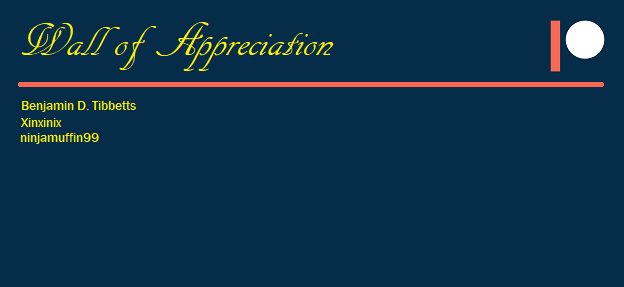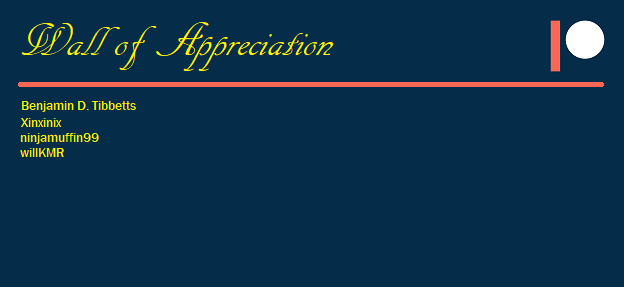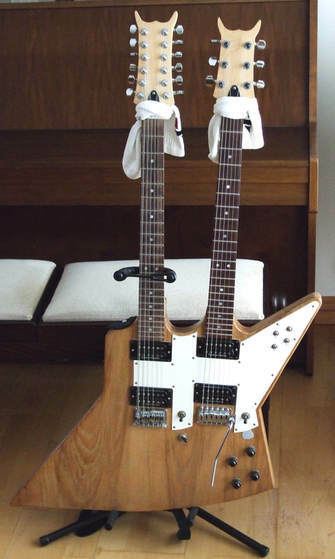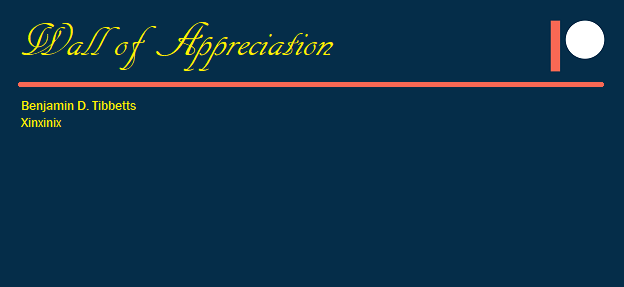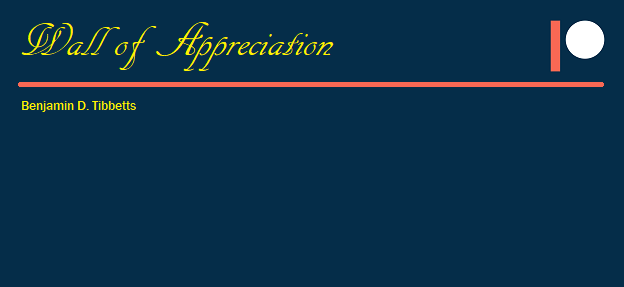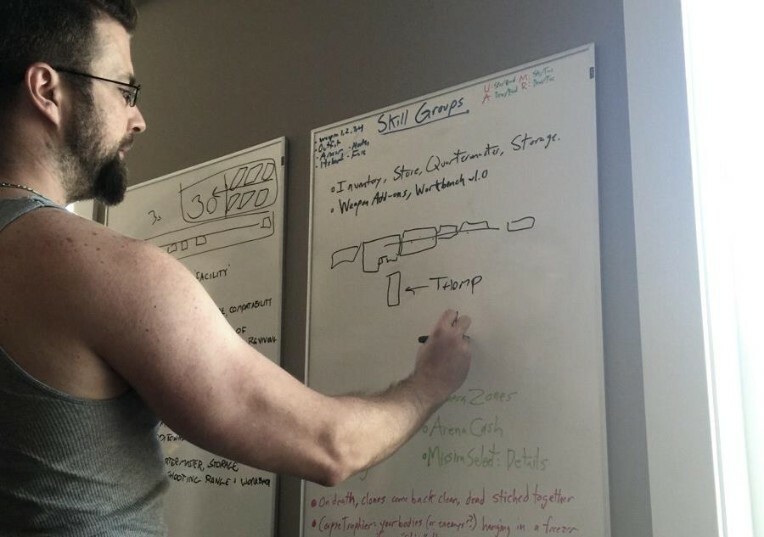
Interview No. 169
Interview By: @The-Great-One
[ PART 1 | PART 2 | PART 3 ]
Q: Closing Scene and See Ya Later are two similar songs that have some inspirations from Hayao Miyazaki. You joined the Anime Society around your college years. Which anime would you say have given the most inspiration to your music?
A: With regards Closing Scene and See Ya Later, they were also inspired by Joe Hisaishi’s musical scores. Incredible composer! Indeed I was a member of the Durham Manga and Anime Society throughout my 4 years at university. In terms of the anime which have been the most inspirational to me... that’s a really tough question. It’s different depending on which of my musical projects I’m thinking about, and of course there are a tonne of anime soundtracks which haven’t explicitly been much of an influence but I simply love too!
For Better Than The Book, The Pillows’ soundtrack to FLCL and the show itself were an incredible influence! If we’re talking about J-rock in general though, then there’s a fair few bands which have been featured in anime I’ve not seen which are probably an even bigger influence. Kishida Kyoudan & The Akeboshi Rockets are amazing, as are OreSkaBand. Actually one of the biggest expanders of my musical taste which introduced me to a tonne of great bands was the AMV HELL series. That showed me Ellegarden which was a huge influence on BTTB!
For Jabun, no doubt Yoko Kanno’s Ghost In The Shell: Stand Alone Complex soundtrack was a big inspiration to me, especially in terms of sound design. Some of the newer stuff I’m working on is heavily influenced by this, and Yoko Kanno’s a fantastic composer whatever she’s working on! Kenji Kawai’s Ghost in the Shell and Innocence soundtracks were fantastic too and Hiroyuki Sawano’s soundtrack to Attack on Titan and Kill La Kill have definitely influenced my soundtrack work as Jabun. There’s waaaay too much great anime related music I could talk about!
Q: The Legend of Zelda series is a favorite of yours. What is it about the games that you like? Does the music by Koji Kondo have any influence to your work? If so, then how?
A: Ah man, I do very much love these games! The name Jabun even comes from one of the characters in Wind Waker, that giant fish which you can’t understand unless you play through the game a 2nd time! One of my early experiences of the internet was joining a Legend of Zelda forum back in the day called “Great Deku Tree Forums” and Jabun was my chosen username. It kind of just stuck as an online persona after that, and later as my musical artist name.
I love the stories and characters in the LoZ series and the franchise has brought me to tears on many occasions. It's so heartfelt and moving. I love the gameplay; the puzzles and dungeons, the direct platformer type combat, rather than the turn based battle style of Final Fantasy. I love the worlds they’re set in and the cross-game tie -ins and references, the mini-games too. My first LoZ game of my own was Oracle of Ages for the Game Boy Colour and it blew me away! Although I didn’t have a GameCube at the time, I remember watching my friend sailing around the vast ocean in Wind Waker too during my early teen years. It was so peaceful and relaxing, and man oh man, Koji Kondo’s music was beautiful! I don’t think his compositions have directly influenced my own musical work but I certainly enjoy it. I’m sure if and when I get to doing more orchestral work at some point, the music of LoZ will definitely have some sort of influence!
Q: You entered the Avid and Talenthouse competition at one point. While following this story I did not see you post if you had won or lost. What can you tell us about this competition? What were the results?
A: Oh whoa, I don’t actually recall this competition at all (just looked it up on my news posts and apparently it was back in 2013?)! Since I don’t remember, there’s really not much I can tell you about it... apologies. I definitely didn’t win though that’s for sure! I’ve entered a fair few online contests in the past and the only one I recall placing in was 3rd place in the US judge selections for the Korg Monomania Monotron synth sound design contest back in 2011. That was fun! I made a helicopter sound which apparently went down very nicely!
Q: Besides your work with Cyberdevil, the first song I ever heard by you was entitled Better Than The Book - Artificial Ignorance. When would you say you were first introduced to Ska? Could you define it for our readers? What was your take on it when making this song?
A: Oh! Going back a couple of questions, actually I’ve got to give my most influential anime for Better Than The Book without a doubt to Digimon: The Movie for introducing me to ska punk when I was a child! The soundtrack to that movie (the English dub) was incredible: The Mighty Mighty Bosstones, Less Than Jake, Smash Mouth, as well as a tonne of kid friendly but incredible pop punk courtesy of Jasan Radford, Jason Gochin, and Paul Gordon! I didn’t even know what ska was back then, but loud guitars, walking basslines, off beat skankin’, and blaring horns blew my tiny mind and would stick in my head for the rest of my life! The Sonic Adventure 2 soundtrack was similarly an inspiration and introduction to ska punk. Zebrahead even worked on some of the Sonic games!
So I guess I was first introduced to ska when I was 12 or so, but back then I didn’t really know anything about it. I’d also heard bands like Madness and that was pretty catchy though I didn’t know much of that either. It was only later that I’d learn more about Ska’s history and it’s certainly an interesting one!
First of all (to the best of my knowledge), Ska is a genre of music which started in Jamaica in the 1960s. At its core, it’s generally characterised by a traditional rock band arrangement with an added brass section. A typical ska band could be 1 or 2 lead vocalists, a guitar (or 2) and bass, drums, and a 2-5 part horn section (for a 3 piece, maybe a trumpet, tenor sax and trombone for example), maybe organ too. You’d often have the instrumental players doubling as backing vocalists too. There’s definitely a crowd vibe about it in my experience. Sound wise, off-beat “skankin’” guitars, walking basslines, and “bubble” organ were signature sounds of the genre which resembles fast upbeat reggae. Ska in Jamaica would later evolve into the slower more well known reggae. 1960s ska is referred to as the 1st wave of ska, or Traditional Ska.
In the ‘70s and ‘80s, immigration would bring Jamaican culture and ska music to the UK, where it would merge with the current UK punk scene to become what was known as 2-Tone, or 2nd Wave Ska. This is where bands like The Specials and Madness come into the picture.
Fast forward a little more to the late ‘80s and the popularity of 2-Tone would cross back over the Atlantic to the USA to influence American pop punk and bring about the rise of ska punk bands. More upbeat and hyperactive than ever, with groups like The Mighty Mighty Bosstones, Less Than Jake, and Reel Big Fish, Ska Punk would come back into popularity throughout the ‘90s as the 3rd wave of ska. This and beyond is where most of my ska influences come from.
Ska’s popularity peaked around the turn of the millennium before falling back into obscurity as a “dead to the worldwide mainsteam” genre in the ‘00s, though the underground scene is very much alive and there is still a big ska punk community in Japan and other places too. With things rising under the surface and sub genres such as Ska-core gaining momentum there’s been talks in recent years of a 4th wave coming, but we’ll have to wait and see! Ska is certainly gaining popularity as the butt of jokes recently (Brooklyn 99 anyone?), but it’s all in good fun!
In terms of my take on ska, especially in Better Than The Book’s Artificial Ignorance, it’s all about having fun, telling stories of life, and often putting a smile on bad situations (within reason). If you watch almost any slice of life anime, you’ll no doubt hear those off-beat skankin’ guitar chords and cheerful melodies in the background music at some point! It’s a form of catharsis for me, a letting go of negative feelings (in Artificial Ignorance’s case, about having your trust broken) and just having fun while venting those emotions. That philosophy goes for a lot of my tracks as Better Than The Book. Ska is the music of life, at least that’s the impression that I get!
Q: sorohanro is not an unknown name here on the site. He is the creator of the theme song for The Interviewer. You have had the chance to work with him on two songs, Forward and Two. What can you tell us about working with Mihai?
A: As one of my first clients as a mastering engineer Mihai taught me a lot about working with people in a professional way. Forward and Two were tracks I mastered for him, but jazz was not a genre I had much experience working with at the time, and it was a difficult dive in for me. While I ended up making some fairly decent masters which fulfilled the requirements he’d asked for, I was unsure of myself and it wasn’t my best work, and although fairly happy with the results he called me out on it honestly. It turned out that rather than focussing on my lack of jazz knowledge and trying to compensate, I should have been following my gut of what I thought sounded good, rather than trying to match reference tracks I had no experience with. That was a hard to hear but very valuable lesson that improved my mastering technique greatly and one I cherish from Mihai. He was very nice about the whole thing too, and although it’s not on Newgrounds, he ended up getting me a fair amount of work mastering some other projects he was close to after that. Working with Mihai was a great learning experience and I’m really happy to see he’s still making music and doing well. He’s an honest and encouraging guy with a big heart. Very easy to work with too!
Q: A favorite of mine by you is entitled Mr. Knife. It was made for a Tiny Tim style animation. Who approached you for this song? How much did you know about Tiny Tim before making it? What was the process in making it?
A: Haha, seems like a lot of people like this one! So Mr. Knife was originally supposed to be used in the animation “The Best Pokemon” (https://www.newgrounds.com/portal/view/650456) by Dieseling but because of timing and changes to the production it didn’t end up making it into the final animation. I knew a little about Tiny Tim before writing this, mainly from horror movies, such as Insidious. “Tiptoe Through The Tulips” and “Livin’ in the Sunlight, Lovin’ in the Moonlight” were the only tracks I really knew, and I still don’t know much about him apart from that.
The process for making Mr. Knife was a fun and experimental one! Tiny Tim was very much known for his ukulele, but I didn’t have one, so to try and emulate that sound, I put a capo high up on my acoustic guitar and shoved a sock underneath the strings by the bridge to get that classic muted tone. Laying down the bass, drums, percussion, and additional strings was quite normal, and writing the lyrics was good fun. For once, I think they came quite naturally! Singing was just a case of singing very high to try and impersonate Tiny Tim’s falsetto style and that was ok too, although not something I do often. The real magic of the production though came in the mastering. I wanted to have it sounding more era specific so I added effects to degrade the audio like an old worn record. Without changing the pitch too, I sped the track up juuuuuust a tiny bit, enough that it wasn’t super noticeable but so that the vibratos of my voice seemed just a bit more quivery than natural, raising the hairs on the back of my neck in uncomfortableness. It’s almost like a vocal uncanny valley. I was super pleased with the way this one turned out!
Q: What was the evolution behind the song GG [Good Game]? What was the Guitar Guitar Remix Contest?
A: So GG started as simply the entry to the Guitar Guitar Remix contest but later evolved into what would become track 08 on my 2nd full-length album as Better Than The Book, Hopes and Dreams. Guitar Guitar is a big music shop chain over here in the UK and they were running an online contest back in 2015, though I can’t remember what the prizes were. The challenge was to create a track which used the samples they gave you, which if I remember correctly were all from one of the Teenage Engineering Pocket Operators (the Sub I think), and a Korg Volca Bass synth. You could do anything you wanted with them, so I used them in the backing electronics and laid down some guitars, bass, and drums in a very Better Than The Book pop punk style. The whole thing was written, recorded, mixed, and mastered (and the artwork drawn) in less than 36 hours, so it was a pretty rough rush job and I didn’t have time to write any lyrics. Instead I played a synth lead to fill in the space of the vocal melody. No wins for me again this time but it was good fun!
Years later, I finally wrote some lyrics for it so the whole track got an overhaul with extra parts added and a new mix / master for 2019’s Hopes and Dreams album. I also did a silly MLG dank meme remix April Fool’s prank with it in 2018 “MLGG” when I was working on the album. That went down a treat!
For the Better Than The Book live band, which was formed at the end of last year (2019), I stripped down the arrangement to a traditional 2 guitars, bass, drums, and vocals set up. It was easier than having to rely on live synths or a backing track and I think it works really nicely, though with the whole COVID-19 situation, we’ve been unable to go out on the stage and play it yet... might be a while now...
Q: What can you tell us about working with Cyberdevil on Better Than The Book - Head Above Water? How did this project start and when did you both know it was done?
A: It was a blast! I approached Cyberdevil about the project while I was writing and working on the Two Years On album and asked him whether he’d like to lend his voice for a guest verse on a track with the working title “HipHopPunk”. It started out as just a simple groove on my MPC which I’d been sitting on for a while, and while I was working on the instrumental, we discussed it and drew up some contracts for royalty splits and all that jazz. I can’t remember whether I sent him just a work in progress instrumental to work with, or whether it already had my vocals on it (probably did have my vocals), but I’d set aside a verse for him and he came back with an outstanding and inspirational first draft rhyme for it. It was glorious! I think there may have been a couple of small edits, but CD had really nailed it! We made sure his lead part was sounding the best it could then I wrote out some suggestions for any adlibs and he adlibbed a couple of extra bits too I think. After he’d finished recording all his parts (this was all done over the net btw) and were both happy with the performance, I took all the material to get it mixed ready for the album. Unlike our previous work together where I was more writing for him, this time he was the guest on my track which was a slightly different dynamic. As soon as he was happy with his performance, it was really (bar a few checks that he was happy with things) up to me when to call the track done as it needed to be consistent with the rest of the album. I think Head Above Water was one of the final tracks to be finished on Two Years On, due to the collaborative nature of fine tuning things, but the time taken was well worth it! It was truly an honour to have Cyberdevil featured on one of my BTTB records!
Q: My absolute favorite song by you and what I believe to be your best work is entitled Better Than The Book - You've Got A Lot To Say. I especially love the lyrics here, they resonate with me on a different level. It is not necessarily a sad song, more bittersweet than anything. Where did the idea for this song come from? What was the process you took in writing and recording it?
A: I really appreciate those words man, it really means a lot. As a warning to those reading, the story behind this song isn’t a pleasant one and those of you who know me closely already know what it means to me. Sometimes writing a song isn’t particularly because I want to, but more that I have a compulsion to. There are times I can’t cope and need to be able to express myself in order to gain something positive from negative experiences and You’ve Got A Lot To Say comes from the absolute darkest moments of my life.
That said, you are correct, I think bittersweet might be the right term for the mood of this song and I wanted to keep the overall subject of the lyrics vague and relatable to as many people as possible. You’ve Got A Lot to Say is about being there for someone you care about and them in turn being there for you in the hardest of times. In this case the lyrics are me speaking to my girlfriend and trying to comfort her (and myself) after the sudden and tragic death of her mother. The song is dedicated to her mum in the album credits.
My girlfriend’s mum was diagnosed with pancreatic cancer in late summer 2017 and it was a long and heartbreaking journey until she passed that September. We were with her by her bedside when she passed and although I’m glad we were able to be there in those final moments, it was an experience I wouldn't wish on anyone. The whole family was devastated, and although You’ve Got A Lot To Say existed already as vague instrumental ideas before then, the track took on a whole new meaning to me after that. I wrote the lyrics while we mourned, and when it came to recording the song the following year it was painful, but something I needed to do to process all we’d been through. My voice is being pushed to its limit, and bending those 12-string notes in the solo until the guitar was screaming was tearing up my fingers, but it couldn’t be done any other way. I can’t really explain it. It was catharsis. It was processing something I’d seen that I couldn’t really understand and that had changed me drastically. It was trying to show I cared, to show tribute and respect, and also move on. It was putting a fragile piece of myself out into the world so that if anyone found it, they might find some comfort, and something good could come from something so terrible.
Q: You not only play and sing the music, but you write it as well. In a song, which would you say you tend to focus or prefer more when composing your song or listening to music, the melody or the lyrics?
A: I think it’s a delicate balance between the two. For me the instrumental parts come much easier to me than the vocals when I’m writing, and the lyrics are often the most difficult part. I feel like the melody usually comes naturally to the words though, it’s almost like the words are telling you how they want to be expressed once the lyrics have a tangible form and are set in stone.
When I’m listening and composing music though, I think the lyrics are less important than the overall melody and vibe of the track (but can still have a lot of importance). I want my lyrics to mean something so I tend to really focus in and work hard on that when writing and let the melody come naturally to them, but if the melody and track feel bland afterwards, then it’s just a poem with music, but not a great song. I think the key job of a good music producer is to let the lyrics and song tell you how they want the track’s arrangement and mix to express them in the best possible way. Great lyrics are always something to aim for, but if presented poorly they can’t make the impact they could have, so if I had to choose, I think less “good / deep” lyrics presented amazingly actually works better, certainly from a commercial point of view. I think there are plenty of examples in the modern chart music industry with questionable lyrics which take this idea to the extreme.
Of course ideally it’d be nice to have great everything, but sometimes “great” lyrics aren’t what’s needed or the most important part of the song. I think about how many songs I don’t even know what the lyrics mean because they’re in a foreign language, but they’re amazing pieces of music! Melody and music are universal; lyrics are usually language locked.
Long story short, I focus more on writing lyrics because I find them difficult, but overall I think melody and music and the appropriate presentation of a song is most important.
Q: What is in your opinion, the definition of music?
A: Music is the expression of melodic and/or rhythmic sound with a purpose. It could be almost anything from minimal ambient background soundscapes to pretty much ignore while you do something else, through to loud and heartfelt anthems that make you want to sing along and dance. Of course not all “music” is to my taste, but I think it’s important for people to be able to express themselves!
Q: When writing a song, where does the first words come from? When does the pen strike the paper and when do you know it is done?
A: I’ll assume we’re just talking about lyrics here. Often when I have song ideas, a line or 2 will just come to me, almost always at the most inconvenient time and I’ll have to jot it down before I forget. I cannot tell you how many times I’ve jumped out of the shower with a towel around my waist (if that) to grab my phone and quickly record a voice memo for a song idea. The process after those initial ideas is a long and difficult one though. I’ll usually grab a guitar and start demoing out a preliminary song structure and make a blank lyrics sheet to fill in with ideas. Once I have the song structure set in stone and a basic instrumental demo (at least rough guitar, but usually some bass and drums too and any other key instruments), I’ll gather ideas for lyrics and slowly fill in the lyric sheet. Sometimes it’ll be a verse which comes first, or a chorus, or something else, and often I’ll have multiple versions of the same section, sometimes completely different, other times maybe only subtly different. I’ll record ideas over my instrumental demo and work on the track exchanging lyrics until I’m happy with it all, then leave it for a while and come back to it and see if I’m still happy with it. If it’s a yes, then I know the song is done and it’s time to record it properly once all the song writing for the rest of the tracks on an album or EP project is complete!
Q: What advice do you have to give to aspiring musicians here on Newgrounds?
A: Practice and learn your craft and tools, and only focus on / put your energy into what you need to as to not overwhelm yourself. Collaboration / working with the right people is a good way to break habits and get you thinking differently and grow as a musician, though be selective about who you collaborate with, you need time to grow with independent study too. Try not to let criticism get you down, but don’t ignore it if it’s structured (of course you can ignore any non-constructive feedback). You’ll eventually get the hang of what things to take to heart and what things to ignore. I’m a firm believer that the apparentness of good music production and songwriting is a delicate balance of personal artistic taste and technical ability.
Doing cover songs is a great way to practice your recording, production and performance technique too without the added pressure of songwriting. It’s super useful for experimenting in new styles and genres you’re unfamiliar with too. Dissecting and recreating tracks from scratch is a very good way to learn how other people produce and structure their songs too from an arrangement and writing point of view and will no doubt improve your own songwriting / production vocabulary.
Another great thing to do is to use reference tracks when you’re mixing / mastering (or even writing). Take a track that you think sounds amazing in the genre you’re working in, and have it playing in your session so you can A / B how your production sounds compared to theirs. How is the vocal and drum level? Do I need more highs on the guitars? I notice a high synth pad adding excitement to this section; shall I try adding something similar to my track in this section which feels a little bland? etc... Remember to turn the reference track down to match the level of your own mixing session.
There’s also a big saying in music production “don’t mix with your eyes” meaning to use your ears to make decisions when producing and not relying on the numbers shown on your equipment. It’s a saying with good sentiment, but remember that meters and scopes are there to help you make decisions too, and as with all tools are incredibly valuable when used correctly. Make friends with your peak and RMS meters, your spectrum analysers, your gain reduction meters, and vectorscopes! They might not add anything to the sound, but when you’re having trouble hearing something, it’s these and your eyes which can help you see and hear things more clearly. They’re great for making objective comparisons to reference material too!
Take your time on projects, but make sure to finish and share them, and allow yourself to make mistakes. There may be times where you don’t know where to go from here so ask for advice from someone knowledgeable that you trust. You don’t have to do everything alone. Full disclaimer: I very rarely release a track (especially an album/EP) without sending it to a trusted source first for them to tear it to pieces so I can build it back up again even better (from a technical mixing/mastering point of view). It’s easy to get lost in your own projects after working on them for a while so a fresh set of trusted ears is always useful. Remember to take breaks too. Also remember things don’t have to be “perfect”, but of course strive for the best of your ability. You’ll know in the back of your mind if there’s something that doesn’t feel quite right in a song or a mix, so don’t be lazy, ignore it, and rush to release it; fix it and keep working until you’re happy with it. Try not to think of every new project as having to be your magnum opus that has to be the best thing ever. Each project is a stepping stone on your journey, and it’s ok to sidestep or even go a little backwards before going forwards again. Remember that when making music, unless you’re doing it for a client or collaboration where it’s someone else’s vision you’re having to interpret, do it for yourself and make it the best track YOU think it is. If other people enjoy it, then that’s a bonus! Remember to start small too. Don’t have your very first project be a 1+ hour album! Start with some singles or an EP and work your way towards bigger things. It’s easy to get overwhelmed and lose motivation otherwise.
Finally, you don’t need to be the best or have the best gear. You just need to do your best and make the best of the tools you have and have access to at the time. As you grow, you’ll realise when maybe it’s a good idea to save up for some clearer headphones or monitor speakers, but make sure your purchases are actually for a good reason, not just “because you think it’ll make you sound better”. Of course I believe it’s good to reward yourself for good work and new instruments / equipment can help inspire new routes of creativity, but make sure you make good use of what you have and invest in yourself wisely. A £1000 hardware compressor is going to be pretty useless if you’ve not learnt how to use the free compressor in your DAW (and there are some great free 3rd party VSTs)!
Of course it goes without saying too, but just be respectful, honest and open with people. It goes a long way and while people won’t usually thank you for it, it keeps doors and paths open.
Q: What can we expect from Jabun in the future?
A: Better Than The Book was supposed to be taking to the stage for live shows this year, but 2020 was a bit of a write-off with the whole lockdown situation and so I’m not quite sure when that’ll be on the cards again. On the bright side I’ve had plenty of time to write and compose more music so there’s a tonne of stuff to come in the pipeline!
In November I’ll be announcing my 2nd album as Jabun which will be released mid December, and another Jabun album will be released early next year as well, probably around March / April 2021 (that one’s still in the works). They’re both experimental explorations of sorts quite different from what you’ve heard from me so far so I hope people get a kick out of them!
I’m also sitting on another 70+ minutes of more traditional Jabun demos for another album (maybe split it into 2?), as well as 20+ minutes of rough demos for the next Better Than The Book project. I’ve been drowning in admin work for that December release lately though, so writing’s on pause until I’ve cleared all that away, but I imagine there’ll be either another Better Than The Book or Jabun album (or both) coming at some point in 2022 (maybe late 2021 for one of them if things go smoothly)! There’s lots of stuff going on with these upcoming releases (as well as recently released ones) over on my Patreon page (https://www.patreon.com/NickStanding) if anyone wants an early sneak peek! I’m sure there’ll be more collaborative projects to do at some point too!
It’s always a busy time over here! I honestly can’t see an end to it, nor do I want to!
Jabun is a rare talent that you don't see in too many musicians nowadays. He is a musician of many hats which is what a lot of musicians used to be like. His songs are not factory produced by writers who are looking for that zany lyric or melody that will stick in people's minds. He makes music that not only he likes, but he thinks people will like. He is truly one of the best here on the site. I know this interview was in three parts, it is the longest interview I have done to date, and I felt it needed to be. Jabun's story needed to be told and I wanted you to experience the journey in hopes that it would inspire you. If you're a musician just starting out, I hope you learned something today and will take it with you.
[ PART 1 | PART 2 | PART 3 ]
The Interviewer is a part of Dohn's Desk Productions
[ SUPPORT ON PATREON | SUPPORT NEWGROUNDS ]
